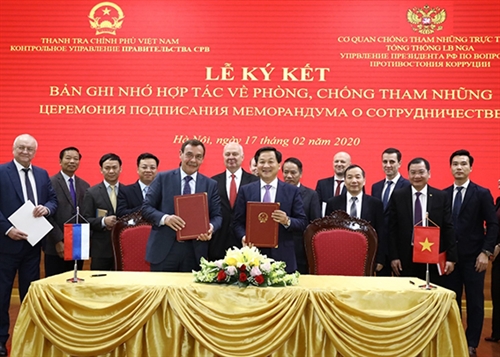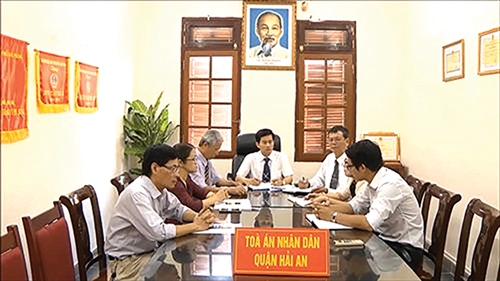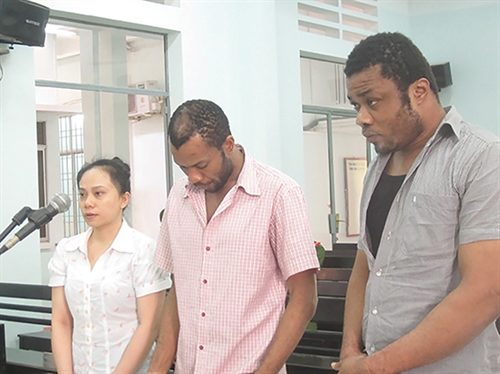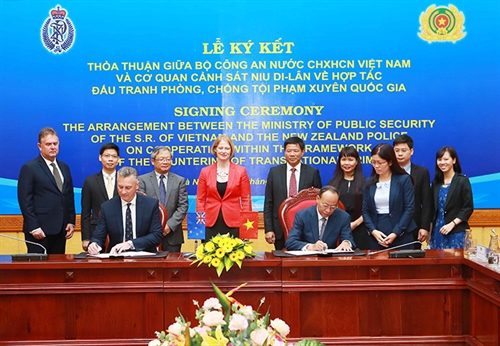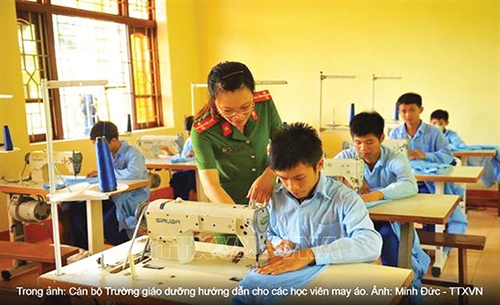The adversarial process in trials enshrined in the 2013 Constitution is a milestone marking changes in viewpoints and approaches during judicial reform toward an independent and transparent judicial system. This article introduces the adversarial process in trials as recognized in the Constitution and concretized in the procedural laws of Vietnam.
Mai Thi Mai, LL.M.
Constitutional Law Lecturer
Administrative Law and Theory of State Faculty, Hanoi Law University
Recognition of the principle of assurance of adversarial process in trials under the 2013 Constitution
To meet requirements on improvement of the organization and operation of the court system set forth in the Judicial Reform Strategy through 2020 under Politburo Resolution 49-NQ/TW dated June 2, 2005, the principle of assurance of adversarial process in trials (adversarial principle) was enshrined for the first time in the 2013 Constitution (the Constitution)[1]. This is one of the basic principles established to ensure the courts’ fulfillment of their task of protecting justice provided in the Constitution. Those constitutional principles serve as important and overall legal guidelines for operation of Vietnam’s court system.
Before being officially included in the Constitution, the adversarial principle was mentioned in some resolutions concerning judicial reform and used as a guideline for the building and reform of the legal system. Specifically, Politburo Resolution 08/NQ-TW dated January 2, 2002, on central tasks of judicial work, clearly indicated “Improving quality of public prosecution by procurators at court hearings, ensuring democratic adversarial process with lawyers, defense counsels and other proceeding participants”, and required that “Court judgments and rulings must be mainly based on results of adversarial process at court hearings, taking into comprehensive consideration all evidences, opinions of procurators, defense counsels, defendants, witnesses, plaintiffs, and persons with related lawful rights and interests.”
Resolution 49 also stressed on “Reforming organization of court hearings, more clearly defining positions, powers and responsibilities of proceeding-conducting persons and proceeding participants toward guaranteeing publicity, democracy and strictness; raising quality of adversarial process at court hearings, considering it a breakthrough of judicial activities.”
In a broad sense, assurance of the adversarial process in trials requires the parties participating in trials to ensure that all rights and interests of litigants are fully exercised and protected as they should be. This process starts from the time of lawsuit initiation by a litigant and concludes with the making of court judgments and rulings. In other words, the adversarial principle should be adhered to in all proceeding stages: lawsuit or case initiation, acceptance of lawsuit or case for settlement, prosecution, and trial (first-instance and appellate).
The adversarial principle is concretized in Article 13 of the 2014 Law on Organization of People’s Courts as follows: “The adversarial process is guaranteed in trials. The court shall ensure that proceeding participants can exercise their right to make adversarial arguments in trials. The adherence to the adversarial principle in trials must comply with the procedure laws.”
As per this provision, the adversarial process can be construed as making of arguments and counter-arguments and opposition between litigants with regard to evidences, claims, accusations and defenses provided or made at court hearings[2]. Positions and roles of litigants in this process are clearly provided only in the trial stage; in criminal procedure, they are the accusing side (procurators) and the defending side, while in non-criminal procedure, they include plaintiffs and defendants (or respondents).
The adversarial process, as a constitutional principle guiding operation of the court system, is closely related to other court operation principles which all aim to build an independent justice functioning to protect the legitimate rights and interests of the people. The official recognition of this process facilitates improvement of organization and operation of the judicial apparatus as well as awareness of judicial officers and the people about legal proceedings, thus helping step up judicial reform and build a progressive, democratic, fair and objective justice system.
In trials, this process helps the court protect and guarantee human rights and citizens’ rights in proceedings through ensuring the equal right of litigants to proactively and publicly invoke legal grounds and make their adversarial arguments in order to clarify facts of their cases as important grounds for the court to make fair and impartial judgments and rulings. So, it can be said the recognition of the adversarial process in the Constitution and the 2014 Law on Organization of People’s Courts has shown a significant progress in legal awareness and understanding, thus helping step up the judicial reform in the country.
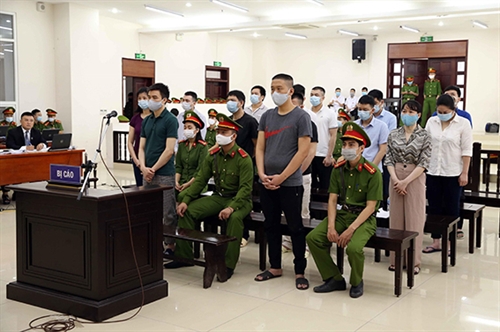 |
| Defendants in the smuggling case at Nhat Cuong Trading and Services Co., Ltd. at the court hearing on May 5__Photo: Pham Kien/VNA |
Specific provisions on adversarial process in procedural laws
Evaluation of how the adversarial process is guaranteed in trials can be made through analyzing relevant specific provisions of the procedural codes and laws[3]. Under these provisions, the principle of assurance of adversarial process serves not only as an operation principle of courts but also as a basic principle of the criminal procedure, civil procedure and administrative procedure.
Adversarial process under the 2015 Criminal Procedure Code
This Code specifically provides a mechanism to realize the adversarial principle: “In the course of initiation, investigation, prosecution or trial of a criminal case, investigators, procurators, other persons competent to conduct the proceedings, criminally charged persons, defense counsels and other proceeding participants have the equal right to present evidence, assess evidence and make requests to clarify facts of the case.”[4] This provision affirms that the adversarial process takes place not only in trials but also in pre-trial stages because effective adversarial arguments can only be made if involved parties have sufficient time and conditions for collecting evidences, documents and circumstantial facts of cases before they can clarify facts of such cases at hearings.
To ensure effective application of the adversarial principle, it is required to clarify positions and roles of proceeding participants as well as principles they must adhere to. This content is provided in this Code as follows: “… Documents and evidence in case files transferred by the procuracy to the court for trial must be sufficient and lawful. Court hearings to try criminal cases shall be attended by all persons specified by this Code. The absence of any of these persons from a court hearing is accepted only in case of force majeure events, external obstacles or other circumstances specified in this Code. The court shall create conditions for procurators, defendants, defense counsels and other proceeding participants to fully exercise their rights and perform their obligations and participate in the adversarial process at court.
All evidences of guilt, evidences of innocence, circumstances aggravating and circumstances extenuating the penal liability, application of points, clauses and articles of the Penal Code to determine offenses, decide on penalties against, and levels of compensation for damage to be paid by, defendants, handling of exhibits and analysis of other circumstances significant to the settlement of cases shall be presented, argued and clarified at court hearings.
The court’s judgments and rulings shall be based on results of the examination and assessment of evidences and of the adversarial process at court hearings.”[5]
These provisions help ensure the presence of all adversaries required at a criminal hearing to exercise their accusing and defending rights for public and comprehensive examination and clarification of evidences and documents related to the case to serve as a basis for inquiry by the court and adversarial arguments at the hearing.
In addition, this Code devotes a whole section, Section V (Articles 306 thru 325), to adversarial procedure at hearings, providing specific proceeding steps to be taken by judges to ensure the adversarial process at hearings. Accordingly, the trial panel is obliged to examine and assess evidences at the hearing before making judgments and rulings based on results of the adversarial process, clearing stating reasons for their acceptance of or refusal to accept adversarial process results.
Adversarial process under the 2015 Civil Procedure Code
This Code also recognizes the adversarial principle as follows: “1. The court shall guarantee that involved parties and defense counsels of lawful rights and interests of involved parties can exercise their right to an adversarial process in first-instance, appellate, cassation and reopening hearings as provided by this Code.
2. Involved parties and defense counsels of lawful rights and interests of involved parties have the right to collect and hand over documents and evidence from the time the court accepts their civil case or matter, and have the obligation to notify one another of the handed documents and evidence; and shall present their responses, views and arguments on the assessments of evidence and applicable law to defend their claims, lawful rights and interests or refute claims of other persons in accordance with this Code.
3. During hearings, all documents and evidences shall be considered in a complete, objective, comprehensive and public manner, except the case of secrecy specified in Article 109.2 of this Code. The court shall conduct the adversarial process, inquire about unclear matters and render judgments or rulings based on results of the adversarial process.”[6]
The provision of Clause 2 above can be understood that the adversarial process between parties can start from the initiation of the civil case until the complete settlement of the case at all levels of hearing. This Code also has the whole Section 3 (Articles 247 thru 263) providing in detail the adversarial process at hearings. It is stated: “The presiding judge may not limit the time of the adversarial process, and shall create conditions for participants in the adversarial process to present all of their opinions, but may ask them to stop presenting opinions irrelevant to the civil case.”[7] These provisions constitute grounds for effecting the mechanism for realizing the adversarial principle in trials for civil cases.
However, it can be seen from the above provisions that the judge still plays a very important role in administering civil hearings and exerts an indirect influence on the trial panel’s making civil judgments and rulings, not just acting as “arbitrator” to hear and coordinate hearings based on statements, arguments, confrontations, testimonies of litigants. The court (the judge) may also take measures to collect evidences[8], take testimonies of witnesses when deeming it necessary[9], or inquire about unclear matters[10]. This shows a reality that despite recognizing the adversarial principle guaranteed in trials, the procedure model applied in Vietnam is still an inquisitorial model intermingled with adversarial process in some proceeding stages, not a traditional adversarial model. Nevertheless, it cannot be denied that elements of the adversarial model have been more and more clearly emphasized, thus helping guarantee the equality of proceeding participants and protect human rights and citizens’ rights in court proceedings.
Adversarial process under the 2015 Law on Administrative Procedures
The current law on administrative procedures recognizes the adversarial principle in trials for administrative cases with a view to ensuring respect for human rights and citizens’ rights in relations between the people and the State and effecting a mechanism to check and supervise the exercise of the state power. Therefore, the role of the administrative tribunal is decided by its functions, including conducting administrative trials, and settling disputes arising in the field of state administration between citizens and state administrative agencies. The establishment of the administrative tribunal and practical trial activities of this tribunal over the recent years have boosted the reform of the national administrative system.
The principle of assurance of adversarial process in trials for administrative cases is directly and fully recognized in Article 18 of the 2015 Law on Administrative Procedures (the Law) as follows: “1. The court shall guarantee the exercise by involved parties and defense counsels of lawful rights and interests of involved parties of the right to adversarial process in first-instance, appellate, cassation and reopening trial in accordance with this Law.
2. Involved parties and defense counsels of lawful rights and interests of involved parties may collect, submit and provide documents and evidences after the court accepts the administrative case and shall notify one another of the submitted documents and evidences; may present their arguments, counter-arguments and viewpoints on the assessment of evidences and laws applied to defend their claims and lawful rights and interests or to reject claims of others in accordance with this Law.
3. In the course of trial, all documents and evidences shall be examined in an adequate, objective, comprehensive and public manner, unless they are not allowed to be publicized in accordance with this Law. The court shall administer the adversarial process, inquire about unclear matters and base itself on adversarial results to make judgments and rulings.”
Like the 2015 Civil Procedure Code, the Law specifies contents and methods of adversarial process at hearings[11], and affirms the role of the adversarial process, saying: “… During the deliberation, the trial panel may base itself only on documents and evidences already examined and considered at the court hearing, results of the adversary process at the court hearing, opinions of procurators, and provisions of law, and study and apply relevant administrative court precedents (if any) before deciding on the following matters…”[12].
At a court hearing for an administrative case, adversarial process participants (adversaries) are parties initiating the lawsuit (plaintiffs), defendants, and persons with related rights and obligations. Under provisions concretizing the adversarial principle, these parties are all equal and have the right to invoke evidences and legal grounds and present their arguments and counter-arguments to prove and protect their rights and interests before the court. The administrative tribunal at such a hearing acts as a proceeding conductor just to supervise and administer the adversarial process without participating therein. The presiding judge may not limit the period of time for adversarial process so that all adversaries can fully present their opinions but may rule out opinions irrelevant to the case[13]. These provisions aim to ensure the democratic and fair adversarial process at administrative hearings.-
[1] Article 103.5 of the Constitution.[2] This interpretation of the adversarial process seems to narrow the connotation of the traditional adversarial model in the countries of the Common Law system where adversarial and confrontation process starts from the pre-trial stage and goes on during trial.[3] Namely, the 2015 Criminal Procedure Code, the 2015 Civil Procedure Code, and the 2015 Law on Administrative Procedures.[4] Article 26 of the Criminal Procedure Code.[5] Article 26 of the Criminal Procedure Code.[6] Article 24 of the 2015 Civil Procedure Code.[7] Article 247.3 of the 2015 Civil Procedure Code.[8] Article 97.2 of the 2015 Civil Procedure Code.[9] Article 99 of the 2015 Civil Procedure Code.[10] Article 24 of the 2015 Civil Procedure Code.[11] Article 175 of the 2015 Law on Administrative Procedures.[12] Article 191.3 of the 2015 Law on Administrative Procedures.[13] Article 175.3 of the 2015 Law on Administrative Procedures.
